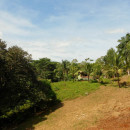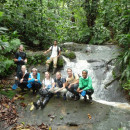The Experience of a Lifetime. Past Review
By haley.kearns.1 (Environmental Science, Elizabethtown College) - abroad from 02/04/2013 to 05/09/2013 with
The School for Field Studies / SFS: Panama - Tropical Island Biodiversity Studies
EVERYONE SHOULD STUDY ABROAD! It doesn't matter where you go, just go somewhere! This study abroad experience really helped me open my eyes to how different the world is from the U.S. I want to travel everywhere.
Review Photos



Personal Information
| How much international exposure did you have prior to this program? | 1 month - 6 months |
Review Your Program
|
* Overall educational experience
Academic rigor, intensity, resources, etc. |
We had class 6 days a week, Monday-Saturday. The days started at 7 a.m. with breakfast. Generally we would be in the classroom from 8-12, and then after lunch we would go for a hike through the forest or go snorkeling. The classes were very interesting and the professors who taught them were awesome! Because of our location (a small island), we were able to connect with our professors in ways that would not be possible at a normal university. We ate breakfast, lunch, and dinner with them, and sometimes they even stuck around after to play games and socialize! We never had too much school work, but I never felt like I wasn't learning. The only difficult part about doing school work was that we shared an internet stick with our roommates-- the internet was slow and spotty, so getting school work done that required research was often difficult. |
|
* Host Country Program Administration
On-site administration of your program |
Our Student Affairs Manager (SAM), was there for everything we needed. |
|
* Housing:
How satisfied were you with your living arrangements? |
There were only seventeen students living in Solarte Inn, and there were three students per room. Each room had it's own bathroom. In my room, I was only living with one other student. We got stuck in the basement (which had it's pros and cons).. we were more separated from the other students, but it was a lot quieter and cooler downstairs. For half the semester I had my own full-sized bed! Bathrooms were cleaned by a worker once a week, and they were newly renovated and kept clean. |
| * Food: |
We had our own cook who came in and cooked dinner for us 6 nights a week! When she cooked we ate delicious meals. We had cereal and toast for breakfast and leftovers and deli sandwiches for lunch. |
|
* Social & Cultural Integration:
How integrated did you feel with the local culture? |
We shared our island with a few ex patriots and a village of Ngobe people. In the beginning of the program we would go to their village and teach them English. We also spent some time with them making tamales! Some of the students developed great friendships with the locals. It was really up to your own discretion how much you wanted to immerse yourself in their culture. We also had time to go into town and experience an entirely different way of life! |
|
* Health Care:
How well were health issues addressed during the program? |
Most students experienced some form of digestion issues at some point during the semester. This was treated easily. If you had to go into town to see the doctor you would usually end up spending many hours in the waiting room. No one ever had to go to the hospital, which was good because it was on the main island and would take a bit of time to get to. For this program I got more than the necessary amount of vaccines. I had my rabies shot, as well as yellow fever and typhoid. You had to be careful about where you ate and drank, because oftentimes the water was not filtered well. |
| * Safety: |
Our island was generally safe- at one point we had a few items stolen from our student common room. Bocas Town was a small town. You just had to use your common sense when walking around town- don't travel alone, at night especially, and always watch your belongings. I never felt like I was in danger at any point during my trip. |
| If you could do it all over again would you choose the same program? |
Yes
|
Finances
|
* Money: How easily were you able to live on a student's budget?
(1 = not very easy/$200+ on food & personal expenses/week, 2.5 = $100/week, 5 = very easily/minimal cost) |
It was up to the student how often he/she wanted to leave Solarte Island and go into town. Although we had a curfew and had to be back on Solarte by 10 or 11 depending on the day (curfew was annoying but understandable), students sometimes went into town after classes ended and spent from 6-10 there. What really racked up were boat-taxi expenses. It was around 3 dollars to get into town and 3 to get back. Depending on how often you went into town, that could really add up. Drinks and food were generally lower than prices in the U.S. I think I spent a lot less money abroad in Panama than a student would in Europe or Australia. The area just had a lower price of living. |
| Not including program expenses, about how much money did you spend on food and other expenses each week? | 15-30 |
| Do you have any general money-saving tips for future study abroad participants? | Eat at Solarte Inn as much as you can! |
Language
| * Did your program have a foreign language component? | Yes |
|
How much did the program encourage you to use the language?
0 = No encouragement, 5 = frequent encouragement to use the language |
We took a one week course at a Spanish language school. We also had to give a presentation at the end of the course to the locals, which we did in Spanish. We were encouraged to talk to the village and many of them could not speak English. Many of the people who lived in Bocas town spoke English though. When we were at Solarte Inn, it was just a bunch of American students, so we always spoke in English. |
| How would you rate your language skills at the beginning of the program? | None |
| How would you rate your language skills at the end of the program? | Intermediate |
| What was the highest level language course you had completed prior to departure? | None. However, I was the only student who had not taken Spanish in a while, so I struggled a lot more than anyone else. |
| How many hours per day did you use the language? | |
| Do you have any tips/advice on the best ways to practice the language for future study abroad participants? | Now I believe SFS Panama requires students to have taken one college (or high school) course in Spanish before attending this program. So no one will have the same problem I did. |
Other Program Information
|
* Where did you live?
Select all that apply |
|
|
* Who did you live with?
Select all that apply |
|
|
* Who did you take classes with?
Select all that apply |
|
| About how many local friends did you make that you will likely keep in touch with? |
A Look Back
| * What did you like most about the program? |
|
| * What could be improved? |
|
| * What do you know now that you wish you knew before going on this program? | I should have taken more chances and explored more. I should have participated in every activity and I should have jumped into the crystal clear ocean every day. |
Reasons For Studying Abroad
| To help future students find programs attended by like-minded individuals, please choose the profile that most closely represents you. |
The Nearly Native or Trail BlazerCraving the most authentic experience possible, perhaps you lived with a host family or really got in good with the locals. You may have felt confined by your program requirements and group excursions. Instead, you'd have preferred to plan your own trips, even skipping class to conduct your own 'field work.' |








